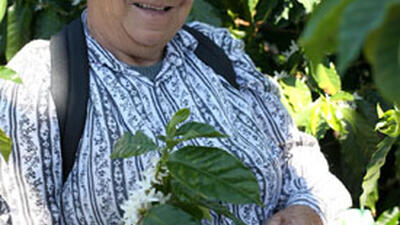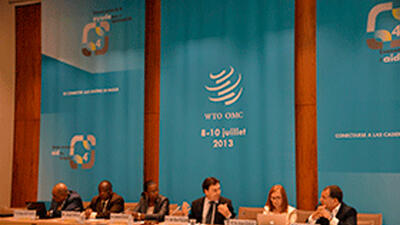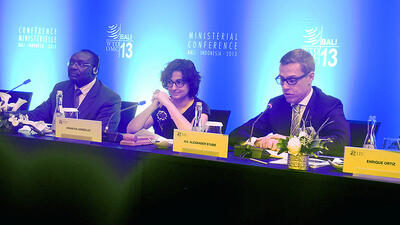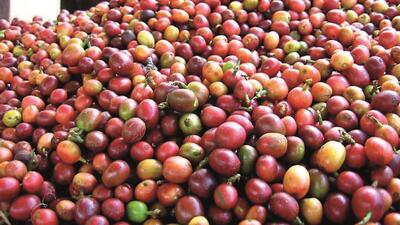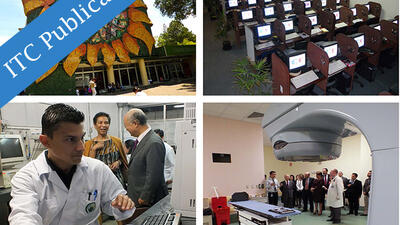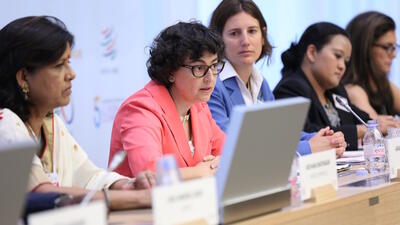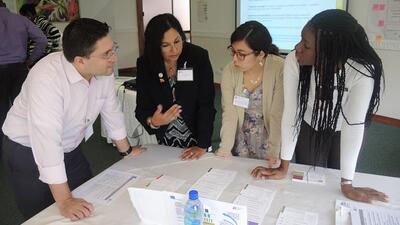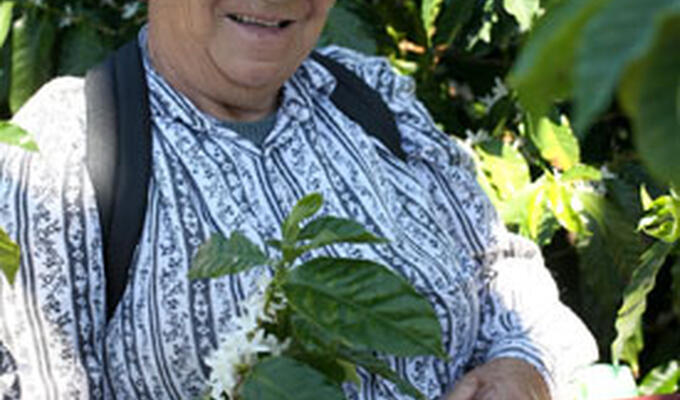
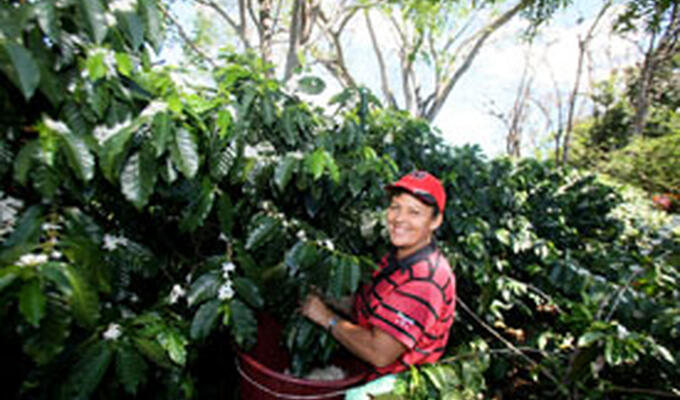
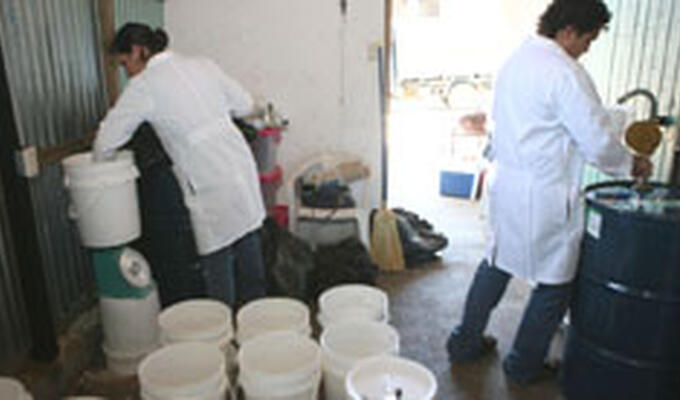

Bringing inspiration to full flower
In 1999, Charlotte Robert took some time off from her job at the Swiss Ministry of Economy to learn Spanish in Costa Rica. During her walk to and from school each day, she was struck by the fragrance of the blossoms from a certain plant in many people’s front gardens, and soon learned they were coffee trees.
‘My first reaction was to look for a perfume using that essence,’ Robert says. ‘I asked a friend who was a professional ‘nose’ in New York whether such a scent existed. Her response, after looking into it, was that it did not.’ And so the seed of a business was formed.
The scent of opportunity
Not everyone has what it takes to bring an idea to life — the drive, the vision, the experience of getting things done. Not everyone has the courage to try. Even then, the barriers to entry may prove too high.
Robert, a Swiss national, waited for her retirement before turning her energies to creating a perfume from coffee blossoms. Having determined that Costa Rica — with its relatively well-educated population, proximity of coffee fields to laboratories and throngs of tourists — was the best Central American country from which to base her efforts, she threw herself into product development.
At the time, she knew next to nothing about creating a perfume, or selling it. She also had no wealth of her own to invest in her venture. That said, she had many personal advantages. She had spent most of her professional life in economic development, mostly in a project management role, and was undaunted by doing business in a foreign country. She was familiar with the kinds of difficulties businesses can face in developing and transition-economy countries. She also spoke French, English, German and Spanish, a huge advantage in international marketing and trade.
‘I have run development projects in quite a few African countries — Burundi, Ghana, Nigeria, Rwanda, Senegal — so after I retired, I wanted to take on a project of my own. I wanted to do it my way,’ she says.
Step one was to find a willing coffee grower, and the first question he asked was whether harvesting the blossoms would affect the development of the fruit. No one seemed to know. Even agro-engineers contacted by Robert couldn’t provide a definitive answer, but the cafetalero was willing to try, and when the first petals were carefully picked from his coffee trees, the tiny beginnings of fruit were already there.
In 2004, Robert again called on her New York friend, asking her to work alongside a chemical engineer at the University of Costa Rica to determine how best to extract the fragrance from coffee flowers, and subsequently develop a base for the perfume. The following year, they engaged Costa Rican laboratory Aqylasa to combine the components into a perfume. The result far exceeded anyone’s expectations.
With a high-quality product showing real market potential, Robert founded Fleur de Café, and spent the next year focusing on branding, packaging and distribution. Today, Fleur de Café offers an eau de toilette, body lotion, body mist and eau de parfum.
The trials of entrepreneurship
Robert is the first to admit it has not been an easy journey. Every step of the way, she has had to woo investors and identify experts, educate herself in the world of cosmetics and perfume, and navigate endless legal and regulatory obstacles in her quest for customers and market access.
Fleur de Café achieved early success in selling to coffee roasters and vendors, due to the coffee connection, but as a minor sideline and, admittedly, a gimmick for these customers, this segment offers limited growth potential. Selling to the tourism sector in neighbouring countries has been hampered by the company’s Costa Rican roots. Today the company is focusing its business development efforts on the niche market in the United States and Europe.
‘The technical aspects of creating a perfume were far simpler than gaining access to the European market,’ she says. ‘Free trade is pure theory; in reality, the obstacles are absolutely huge. How would I know it was necessary to create a subsidiary company just to open a bank account? How would I know how to deal with taxes in two countries? Pollution concerns, allergens, bottling requirements — there’s always another hurdle to cross.’
Although Robert has experienced little apparent gender discrimination as an entrepreneur, she has learned that a businesswoman in Latin America must be careful how she expresses her disagreement with a man, especially if he is rich or politically powerful. Before an exchange on equal footing can occur, she says, men need to be assured of their superiority.
Building local capacity
Fleur de Café demonstrates how even a small start-up can generate side benefits for the country where it operates. The company’s general manager is a Costa Rican woman who is single-handedly creating a distribution channel in the United States — valuable business experience. To keep up with the still-modest 200 unit sales per month, about 30 local women supplement their income by harvesting blossoms during the month of March, a time when there is little other work for them, and all of the operations are carried out by Costa Rican companies. The seed money for the company was also Costa Rican.
‘Starting one’s own business couldn’t be more different from development cooperation,’ Robert declares. ‘On the other hand, the chemists, farmers, labourers, investors and staff are all gaining knowledge and experience that relates to various aspects of the work, especially considering the level of discipline that making perfume requires. This may well help them create new opportunities in the future.’
A wall too high for many
Robert recently secured another round of investment to fund the company’s next phase of growth. Meanwhile, she wonders how resourceful entrepreneurs in Costa Rica and the wider region can break into the most lucrative markets with their products, given the barriers to entry. For example, she tells of a German trade fair she attended a couple of years ago where several other Costa Rican companies were marketing their raw materials for food, perfume and cosmetics. Of those companies, only one — Fleur de Café — has managed to sell in Europe. The others, she says, couldn’t overcome the European trade barriers.
To pass on what she has learned, Robert would like to find time to write a book about her experience or to participate in technical workshops — in Costa Rica and European countries — about trade barriers.
‘It is a fascinating process to know nothing, at first, about what you want to do, to then find and learn from the right people, and to go on learning something new every day,’ she concludes. ‘I have met the most fantastic people along the way.’





